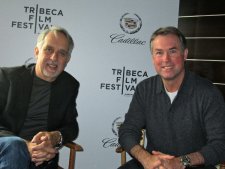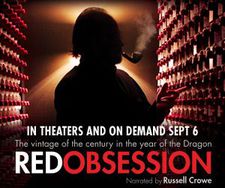Bursting a bubble with Robert De Niro, how a trailer lead to Francis Ford Coppola, shooting in Bordeaux, ending up in China - in our conversation we learn from the astute filmmaking team David Roach and Warwick Ross what Red Obsession is all about. Their film, narrated by Russell Crowe, uncorks the craze taking place in Shanghai of buying wine as an investment and investigates the impact it has on the centuries-old vineyards of Bordeaux, the people who own them, and consumers worldwide.

By chance, the directors and I met on Earth Day and they suggested we rename it Terroir Day in honor of our talk. I started out with the distinct flavor of their documentary.
Anne-Katrin Titze: Red Obsession sets a different mood from other wine films, visually and especially by your choice of music. You start with I Put a Spell On You and end with Fever. Can you talk about the mood you were trying to capture?
Warwick Ross: It was really important to us not to do a standard wine film. David and I have now made four feature films together. I think we know the structure of the feature film and how to surprise people. A standard wine documentary, and there have been lots of films made about wine, they all take the same tone. They love Vivaldi and they use Brahms and we were very determined not to do that. The first thing David and I did was we started playing music to try and set the tone of the film before we even began to film.
AKT: Vivaldi and Brahms are the composers of choice for wine films?
WR: Usually that's what people use, beautiful, elegant, pastoral music and we were very determined not to use it at all. We started playing The Social Network [David Fincher's 2010 film] soundtrack just to ourselves and I said to David, when we go out to film, this is the music we got to have in our heads.
David Roach: In a way, one of the difficulties of making a film like this in France and in Bordeaux, is you are determined not to make that hagiography. And then you go to those places and they are beautiful. There are chateaux and the wine is this ethereal gorgeous thing, so there's always a pressure to be seduced by this. And the people are very sophisticated and welcoming, but we knew we had a much stronger story to tell.
AKT: You are hinting at the more conventional, romanticising wine films early on. You quote people saying "you need love" and "it's all about the gesture."
WR: What we wanted to establish at the very beginning of the film was how beautiful Bordeaux is and how passionate these people really are about what they do. They really are concerned about this very rare and ethereal product, which is this bottle of wine. Once you establish that, as filmmakers, we are allowed to go into a different realm.

DR: Warwick is a vigneron, as well as a filmmaker. I love wine, but I don't know nearly as much as Warwick. In our discussions early on we decided that we would make this film more for people like me. Wine buffs, they are going to love the story but you don't have to like wine or know much about wine to understand the story. We have to let people know what's at stake.
AKT: The documentary starts to turn into a thriller when you get to 2009 and 2010.
WR: Well, we like to think we may have made the world's first wine thriller.
AKT: You introduce China fairly late in the film, and we slowly understand what is at stake for the business of wine.
DR: Filmmaking and story telling is not a science. We knew we would introduce China at some point and early on in the editing process we thought maybe we should be in China right at the start and then come back to Bordeaux. In the end, China was almost like the second act.
AKT: You interview Francis Ford Coppola in Red Obsession. There's double interest, I presume, as winemaker and filmmaker. How did that interview come about?
WR: You know, we were very lucky with Frances. He was in Hong Kong and we were filming the event that he was at. He was there with his wine Inglenook because he's game to sell his wine to China also. We made an approach. It didn't look like we were getting very far. We made another approach and we were told that they take our request and send it back to the head publicist in France. I thought, there's no chance. Then the strangest thing happened the next day, my phone rang it said yes, interview 4 PM, come to the hotel. When I got there, I asked him, how did this happen? He said: "My publicist, who lives in Bordeaux had actually seen your trailer at a cocktail party about three months ago and you screened it for these 60 people at this cocktail party. She was one of the people in the room and she said it was the best trailer she had ever seen and that I had to do the interview and that's why I'm here."
AKT: "The Chinese have no fear. They could just start from zero again," is one of many very strong quotes about the changes in the business with wine. Did you censor yourselves at all? Were there places you hesitated to explore?

WR: No, almost the other way around. We had so many wonderful quotes, really strong, but some of them not quite on topic. Slightly off. Food safety issues in China was a whole chapter that we were trying to explore in the film, and how it relates to wine. Because a lot of the fake wines now, they are putting industrial alcohol in the bottle with a little bit of red dye, and they sell it. It can be really dangerous, drinking a glass of it and it's actually poison in a bottle. There are all these issues but we found in order to get into that you had to allocate almost a chapter of the film.
AKT: This topic could and should be a film on its own.
DR: There are babies in China now getting poisoned by powdered milk that's not made from milk. Of course, the Chinese are very aware of food safety and there's whole new markets opening up. The Chinese are anxious to have food that can be proven to be safe. You see why it became a very interesting topic for us. Especially about wine, about organic wine. There are a lot of organic vineyards in China as well. And yet, as Warwick said, in order to do that properly we just needed too much screen time.
WR: There is another quote from that same gentleman which I loved. He said: China is like a train going really, really fast. Everybody just wants to get on that train, but nobody knows which direction it's going. And pretty soon people are going to say, hey, why don't we slow the train down a little and look around and see where we actually want to go? I thought that was such a strong quote but in relation to our film we couldn't actually make it work.
AKT: Your film had its world premiere at the Berlinale and screened last Saturday here at Tribeca.
DR: It was great. I suppose you heard that Bob De Niro has chosen it as one of his two favorite films in the festival.
AKT: I have not. What was the other?
DR: The United States of Amnesia, the Gore Vidal film [directed by Nicholas Wrathall]. So we are thrilled. As filmmakers you spend so much time sort of in a bubble, that sometimes you lose objectivity. To get it out to an audience and especially a sophisticated audience like New York and for them to embrace it, is thrilling for us.
 |
| US poster for Red Obsession |
Red Obsession is released in the US on September 6. No UK release date has yet been set





















